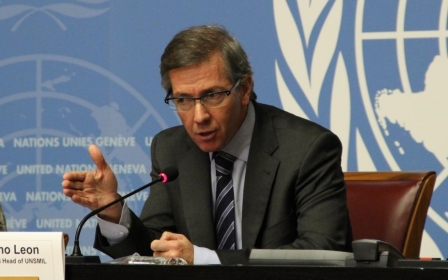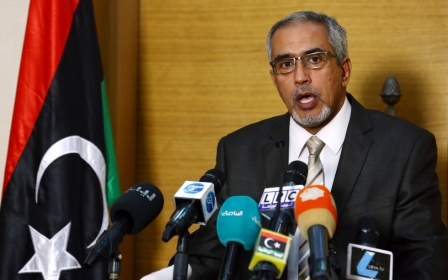Libyan factions agree on 'agenda' for unity government

The UN announced on Friday an "agenda" to form a unity government has been agreed upon by representatives of Libya's warring factions.
"The participants agreed after extensive deliberation on an agenda that includes reaching a political agreement to form a consensual national unity government and the necessary security arrangements to end the fighting," a statement said.
The apparent breakthrough comes after two days of UN-brokered talks between the internationally recognised House of Representatives (HoR) and representatives of various political factions in the country including militias.
Among a series of measures agreed for the agenda, according to the local news site Libya Herald, were the need for “ensuring the release of those detained illegally”, “ensuring the freedom of movement for Libyans throughout the county” and “the payment of salaries to all those who have a right to them without discrimination on any basis.”
There was also an agreement to reject “violence and terrorism” and a call for commitment to the values of the February 17 revolution which drove former leader Muammar Gaddafi from power.
'We are finding solutions'
Politicians were reportedly positive about the direction taken by the negotiations.
“We realised the weight of responsibility on us in this moment in Libya’s history to find solutions,” former Deputy Prime Minister and currently HoR member Mustafa Abushagour told the Libya Herald.
Fathi Bashagha, a delegate from Misrata, also said he too was much encouraged by today’s decisions. “We are succeeding [in finding a solution] – and we will succeed,” he said.
Though senior figures from a rival body, the General National Congress (GNC), were listed as “to be confirmed” on UNSMIL’s website, the GNC said last week they would not be attending the talks while “civilians are being bombed in Misrata,” referring to recent strikes on the western city by forces allied with the HoR.
Libya is in the midst of a fierce civil conflict, with rival cities, tribes and militias battling for control of Africa's largest oil reserves. The GNC, which was replaced by the HoR after elections in June 2014, reconvened to appoint a "salvation" government after the Misratan Led Alliance of Libya Dawn seized control of Tripoli in August.
Division over talks within GNC
Libya Herald reported Tuesday the Misrata municipal council had come out in favour of the Geneva dialogue, going against the GNC statement.
The paper said the GNC statement had “resulted from pressure from the more Islamist elements within Libya Dawn." The Misrata declaration called on Libyans to reject “terrorism and extremism”.
“The Misrata declaration is the strongest indication so far of the growing rift within Libya Dawn between it and the Islamists,” the Libya Herald reported.
Though some associates of the GNC have attended the talks, the congress is set to vote on Sunday whether to officially take part, according to local media.
In addition, a number of ambassadors from France, Italy, the UK and the USA attended the talks as observers.
UN special envoy to Libya Bernardino Leon warned at the start of the talks Wednesday that they would be tortuous and that he had not expected any “breakthrough” by the end of the week.
Call for fiscal 'tightening'
With the country’s economy in tatters as a result of the constant conflict, the Libyan Central Bank – which has reportedly strived to remain neutral in the fighting – released a statement on Thursday calling for “difficult and painful” fiscal tightening.
“The Central Bank calls on all concerned parties to cooperate in dealing with the growing crisis and alert the public about the dangers facing the country in order to restore stability and protect Libya’s future,” read the statement.
Oil production in Libya has plummeted from 1.6 million barrels per day (bpd) prior to the 2011 revolution. With fighting increasingly focused on control of oil terminals, production is now down to around 300,000 bpd which has put a large dent in the country's finances as oil accounts for 95 percent of state revenue and 65 percent of the country’s Gross Domestic Product.
New MEE newsletter: Jerusalem Dispatch
Sign up to get the latest insights and analysis on Israel-Palestine, alongside Turkey Unpacked and other MEE newsletters
Middle East Eye delivers independent and unrivalled coverage and analysis of the Middle East, North Africa and beyond. To learn more about republishing this content and the associated fees, please fill out this form. More about MEE can be found here.



